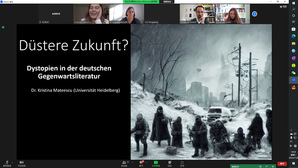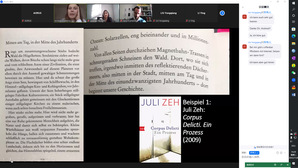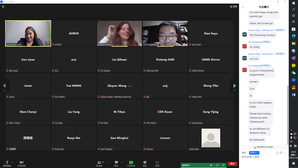The 3rd Lecture by Prof. Andrea Albrecht and Fellows from Heidelberg University Held Successfully
On November 8th, the 3rd lecture of the lecture series given by Prof. Andrea Albrecht and the fellows in her lecturer team from Heidelberg University was held on Zoom successfully. The lecture topic was “Dystopien in Contemporary German literature (Dystopien in der deutschen Gegenwartsliteratur)”. In this lecture, the key speaker was Dr. Kristina Mateescu from Prof. Andrea Albrecht’s lecturer team, and the host was Liu Yongqiang, associate professor from Institute of German Culture in School of International Studies of Zhejiang University. Teachers and students from Heidelberg University, Beihang University and Zhejiang University have attended this lecture.

After briefly introducing the topic of “Dystopien”, instead of defining it directly, Dr. Kristina Mateescu reviewed the “Dystopien” works of literature, films, television and games from Germany and around the world, some of which were familiar in Asia, in order to give the audience the most intuitive sense of “what Dystopien was”. Then Dr. Kristina Mateescu explained “Dystopien” (οὐ τόπος =Nicht‐Ort) which originated from Greek from the perspective of etymology, on the basis of which two classifications of this “place not existing” were made: Raumutopien and Zeitutopien. The distiction between the two forms mainly lies in: The former fictional object is confined to a fixed space, while the latter is mostly a fantasy of the future. Dr. Kristina Mateescu further pointed out that no matter what kind of utopian themes, most of them contain the contrast between fiction and reality, and thus achieve the critical effect. In the Q&A of the first part, Jens Krumeich and the key speaker discussed whether the fantasy world would be constructed in different ways under different countries and cultural backgrounds. After the Q&A, it came the second part.

At the beginning of the second part, Dr. Kristina Mateescu began by elaborating on the previously mentioned structure of contrast, that is, the contrast between possibility and reality, and the contrast between reverse fictional scenarios and historical scenarios (Möglichkeit und wirklichkeit, Fiktionales Gegenbild und Historische Situation). After that, excerpts from three dystopian novels were read word for word led by Dr. Kristina Mateescu. These three novels were Corpus Delicti EinProzess by JuliZeh, AufSee by TheresiaEnzensberg, and DieErinnerunganunbekannteStädte by SimoneWeinmann. Dr. Kristina Mateescu made a detailed analysis of the styles of dystopian novels and how they served their critical purposes in the context of the aforementioned contrastive structures. Here she had a qualitative explanation for Dystopie : Dystopia often describes a world that is contrary to utopia, seemingly peaceful but in fact extremely dark. Some students asked whether the Republic described by Plato was also such an orderly world but under high pressure . Dr. Kristina Mateescu and Prof. Andrea Albrecht clarified this seemingly contradictory question from the perspective of Plato's writing background and purpose.

At the end of the lecture, Liu Yongqiang made a concluding speech. He discussed utopian and dystopian novels from the comparative perspective of Chinese and German literature with the key speaker and several German fellows from Heidelberg University. One of the key questions was why, in the Chinese cultural context, it was generally assumed that the feelings of suffering were varied while the descriptions of happiness were almost the same, but the opposite was true in the conception of utopian and dystopian novels. Dr. Kristina Mateescu explained that in the German context, the understanding of happiness was varied, while the similarity of the construction of suffering was high, which led to the discussion of cultural differences and even the discussion of science fiction works. In the heated discussion, the lecture ushered in the end. Benefited a lot, teachers and students were looking forward to the next lecture of the lecture series.
Image/Text: Fang Jun’an, Ma Xiyuan, Ni Keyi
Institute of German Culture, Institute of German Studies


